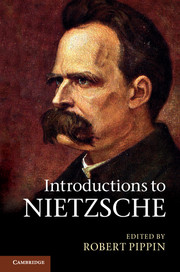Book contents
- Frontmatter
- Contents
- Note to the reader
- Chronology of Nietzsche's life and works
- Introduction
- Chapter 1 Nietzsche: Writings from the early notebooks
- Chapter 2 Nietzsche: The Birth of Tragedy
- Chapter 3 Nietzsche: Untimely Meditations
- Chapter 4 Nietzsche: Human, All Too Human
- Chapter 5 Nietzsche: Daybreak
- Chapter 6 Nietzsche: The Gay Science
- Chapter 7 Nietzsche: Thus Spoke Zarathustra
- Chapter 8 Nietzsche: Beyond Good and Evil
- Chapter 9 Nietzsche: On the Genealogy of Morality
- Chapter 10 Nietzsche: The Anti-Christ, Ecce Homo, Twilight of the Idols
- Chapter 11 Nietzsche: Writings from the late notebooks
- Select bibliography
- Index
- References
Introduction
Published online by Cambridge University Press: 05 June 2012
- Frontmatter
- Contents
- Note to the reader
- Chronology of Nietzsche's life and works
- Introduction
- Chapter 1 Nietzsche: Writings from the early notebooks
- Chapter 2 Nietzsche: The Birth of Tragedy
- Chapter 3 Nietzsche: Untimely Meditations
- Chapter 4 Nietzsche: Human, All Too Human
- Chapter 5 Nietzsche: Daybreak
- Chapter 6 Nietzsche: The Gay Science
- Chapter 7 Nietzsche: Thus Spoke Zarathustra
- Chapter 8 Nietzsche: Beyond Good and Evil
- Chapter 9 Nietzsche: On the Genealogy of Morality
- Chapter 10 Nietzsche: The Anti-Christ, Ecce Homo, Twilight of the Idols
- Chapter 11 Nietzsche: Writings from the late notebooks
- Select bibliography
- Index
- References
Summary
THE NIETZSCHE PHENOMENON
Anyone who has heard anything about Nietzsche has probably heard him associated with many of the following phrases: God is dead. Everything, all of nature and certainly the human world, is will to power, a constant zero-sum game struggle for dominance and mastery. Judaism and Christianity are slave moralities. The motivation for and the meaning of the Christian religion reside in a feeling of “ressentiment” against the stronger, the masters. The Christian moral tradition has culminated in nihilism. Nihilism means “Nothing is true; everything is allowed.” Contemporary morality is herd morality. We require now a transvaluation of values, and it must be beyond good and evil. The representative of these new values will be an Overman or Superman (Übermensch). Everything recurs eternally. There are no objective values or universal moral principles. All understanding is perspectival. Even “physics” is an “interpretation.” “One law for the lion and the lamb” is unacceptable; true human excellence is possible only for an elite few. Our sense of conscious control over what to believe and what to do is an illusion. Consciousness itself is an illusion.
These ideas occur in works that often have hyper-dramatic, apocalyptic titles, as if to suggest some great historical moment was upon us, all written in a “loud,” hyperbolic, often figurative style: The Dawn, The Joyous Science, Beyond Good and Evil, Thus Spoke Zarathustra, The Anti-Christ, The Twilight of the Idols. There is even a book The Will to Power, often referred to and cited by scholars, that is not a book at all, but a collection of his notes, his Nachlass, arranged by his nutty sister to suit more her ends than his. Some of these books seem to be little more than collections of aphorisms; some look like sociological or historical essays; others read like religious sermons, or prophecies, or biblical imitations, or political pamphlets. Some seem to be all of the above at once. Moreover, these books are often treated as exemplifying phases in the development of Nietzsche's thought; early, middle, and late, usually. And scholars argue about whether, and if so how much, Nietzsche changed his mind throughout these periods.
- Type
- Chapter
- Information
- Introductions to Nietzsche , pp. 1 - 16Publisher: Cambridge University PressPrint publication year: 2012

